Donkey, Obey Your Mother
Once, Karakacan, Nasruddin’s little grey donkey, was old and stubborn and needed to go into retirement, so the Mullah went to market and found one that seemed young and mild-mannered, with sturdy legs and good teeth, and bought him. Nasruddin tied up the new donkey to the saddlebag of his old donkey, and away they went.
Unknown to Nasruddin, a thief and his son were following him, planning to steal the young donkey. They kept themselves hidden behind and, before long, as they hoped, Nasruddin nodded off and began snoring as the donkeys traveled down the road.
Quickly the boy removed the new donkey’s halter and tied it around himself without disturbing Nasruddin’s siesta, as his father led the donkey back to market, where it would surely gather an excellent price.
When the three arrived back at the stable, Nasruddin awoke, rubbed his eyes, and realized that something was amiss. Seeing the boy tethered to his donkey, Nasruddin demanded to know where his other donkey was. The boy pleaded for mercy on his soul, exclaiming, “I used to be your donkey, Mullah. You see, I was a stubborn and impudent little boy who constantly disobeyed his mother, and one day, my mother became so disgusted with my misbehavior that she asked Allah to punish me by turning me into the donkey that I must surely be. Suddenly I had four legs and long ears, and a donkey I’d have stayed forever until you, a honest and kind man, bought me and the curse was lifted, Allah be praised. Now that my punishment is over and I’m a human again, please allow me to return to my mother.”
The Mullah scratched his long white beard doubtfully, but he removed the boy’s halter, cautioning him, “Allah be praised that you have been transformed back to a boy. You must promise me to behave yourself this time and to obey your mother’s wishes.” The boy thanked Nasruddin profusely and praised him as a great man of virtue, and off he ran to go home. Realizing that he still needed a new donkey, Nasruddin headed back to marketplace. There, much to his surprise, he discovered the mild-mannered donkey waiting to be brought up again to the auction block.
Nasruddin confronted the little donkey, grabbed its tether, and scolded it in a severe tone, “You little fool! I told you never to disobey your mother again!”
Excerpted from The Uncommon Sense of the Immortal Mullah Nasruddin: Stories, Jests, and Donkey Tales of the Beloved Persian Folk Hero
 Your Daily Nasruddin
Your Daily Nasruddin 
Another great donkey story that is fun to tell and act out. Nasruddin certainly has a unique relationship with his donkeys. In this story his donkey is stolen as if it was taken from under his very own ass, so to speak.
In several other Nasruddin stories, donkeys and boys are characterized as equivalent. At the end, of course, the Mullah speaks to the donkey as if it were a stupid, stubborn boy.

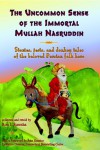
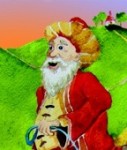
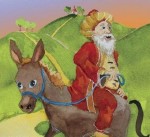
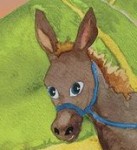
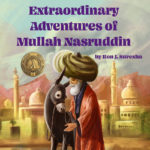
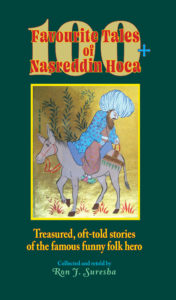
God’s arrears to Nasruddin
God’s arrears to Nasruddin
Excerpted from The Uncommon Sense of the Immortal Mullah Nasruddin: Stories, Jests, and Donkey Tales of the Beloved Persian Folk Hero
Another longer, popular story of Nasreddin Hoca, his wife, neighbor, and the local cadi. I especially like the line, “You can owe me the last one.”